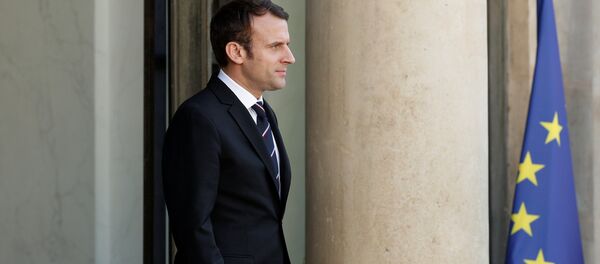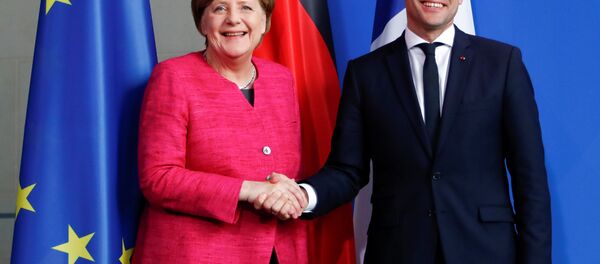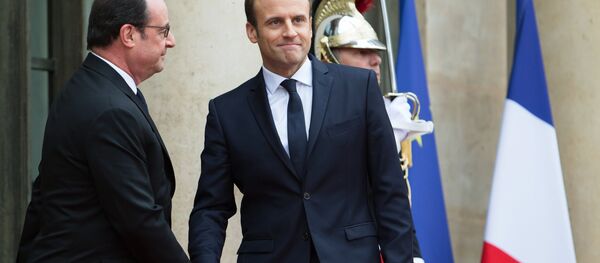AUTHOR OF NEW POLITICAL REALITY OR HOLLANDE'S SUCCESSOR?
From the start of his presidential campaign the former investment banker pledged to create a new political reality in France. The majority of French media outlets and experts on political affairs usually start their talk about Macron with a remark about his major project to renovate the existing political system. Macron seems to be riding the wave of popular dissatisfaction, using it in his rather populist promises.
According to the polls, the French do find his profile appealing, and at the same time the general level of trust to the politicians is incredibly low. But Macron’s background is more than classical. Having in his pocket the diplomas of major administration schools, meant to provide politicians to France, he comes from the same political elites he is now trying to denounce. The reform he promises actually started under Francois Hollande, Macron's predecessor, who ended up as the least popular president of the French Fifth Republic. The difference is that Macron will go to the bottom of these reforms, without needing an approval of the left or the right parties, says Eddy Fougier, a senior researcher at the Sciences Po university.
"In some way he is a successor of Hollande and his reforms, among his major economic reforms there are some inspired by Macron. For example, a 'pact of responsibility' for the enterprises proposed by Macron when he was a president’s counselor. There was also the famous 'Macron’s law' aimed at liberalizing the economy and put in place during his time as a minister," Fougier said.
Macron was an important actor of Hollande’s reforms and is ensuring continuity in this respect, he added, noting that the difference is that Macron stated many times that the reforms did not go far enough and his objective is to go to the bottom of these reforms rather than falling into excessive prudence as the ex-president did.
Macron’s stance on economic reforms is his strong side. With an increasing public debt and an unemployment rate one of the highest in the European Union, France needs to get its finances under control. Macron’s idea is to balance business and politics. France never made a corner stone of its economy, being a battleground for the left and right parties for more than 40 years, Jean Viard, a sociologist standing for Macron’s party in the legislative elections, said.
"It’s the first president who sees the enterprises as a cornerstone factor for producing wealth. In France the enterprise was always in the second place," Viard said.
But some of his reforms are not going to be welcomed. Fougier is certain that France will see a lot of syndicates protest this change.
"His most unpopular reform will be the reform of the labor law, notably allowing the enterprises to lay people off more easily, and that was an object of a harsh criticism, especially by the left parties throughout 2016. And now his ideas are even more liberal, so we will see strikes and manifestations in the future, that’s certain," the expert said.
To put any of his reforms into practice, Macron needs a government to support him. Nominating The Republicans' Philippe as his prime minister, Macron stretched a hand to the right parties, inviting them to stand for him and adhere to his political project rather than stick to a traditional division between the left and the right. And it seems to be working. Hours after the nomination, some 20 members of The Republicans party expressed their intention to support the new president. On Wednesday, that list counted more than 200 people that are ready to offer Macron their services.
The new composition of the French cabinet unveiled on Wednesday afternoon also proves that Macron "breached" the political center, in an attempt to bring together the left of the right and the right of the left, Bruno Cautres, researcher at the CEVIPOF think tank, said.
"It’s difficult for the electorate. Just two weeks ago they saw them [the newly appointed ministers, all coming from different political parties] fighting with each other, and today they are saying – maybe we can work together on certain issues. But all the questions that worry people are still standing: the inequality, the unemployment, the purchasing power, so that’s extremely important for the new government to send the signals to them, saying Macron is a president of all France in its diversity, of all the French people and their different approach to the economy that Macron wants to promote," Cautres said.
In this regard the nomination of Gerard Collomb as the minister of internal affairs is very representative. He has a strong economic program, and as a mayor was responsible for a development of the city of Lyon, third biggest agglomeration in France. Equally respected by the left and by the right, he was labeled "the socialist of the right."
The new government is a mix of political parties and different talents. On Wednesday, Nicolas Hulot, a prominent ecologist who never held an office before, was appointed the minister of ecology – something that seemed absent in the political program of Macron. Francois Bayrou, the leader of the Movement Democratique party, became the new Keeper of the Seals (the title of the country's justice minister), Bruno Le Maire was named the minister of economy, and Sylvie Goulard, who supported Macron from the beginning, became the defense minister. Her predecessor Jean-Yves Le Drian is the only minister under Hollande to stay in the new government. He becomes France's new minister of foreign affairs, a reasonable choice, since Macron has a lot on his plate regarding the relationship with his foreign allies.
German Chancellor Angela Merkel was the first with whom europhile Macron coordinated his position regarding the future of the European Union. Some accuse the French president, who is much younger and much less experienced than his German counterpart, of following the lead of his powerful neighbor. Some experts think the close relationship is a tribute to a dramatic past.
"We owe this relationship to the two world wars, and we decided that we are not going to do that again. We managed to reconstruct the central peaceful block of countries. We often forget that Europe is the world's first economy, but we always lacked political agreements. The idea is to put the political government inside this economic power. France ensures that the French-German alliance is the central engine of the European Union," Viard said.
Inside France, many doubt that Macron can be a strong leader, and criticize him for being far from the people’s interests. In order to give France a strong voice on the international arena, Macron has to put through economic reforms that he promised and become an equal partner of Germany in the European Union, according to Fougier.
"The EU advances if France and Germany are united, but also if their influence is equalized. During past several years it was not balanced. That's why on the certain subjects it was a German point of view to dominate in the European Union – on the euro crisis, on the Greek crisis, on the immigrants," he said.
A new balance might now be reached, as the European Union does not appear to function well while dominated by one state while being torn apart by tensions between other states, Fougier added.





